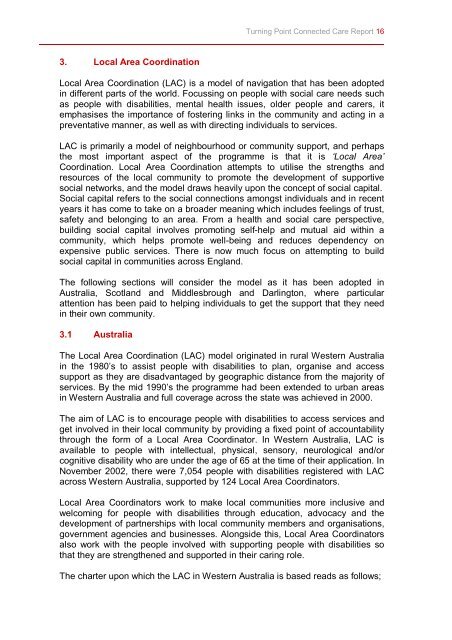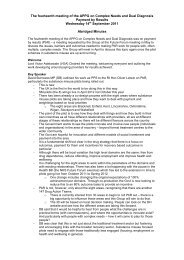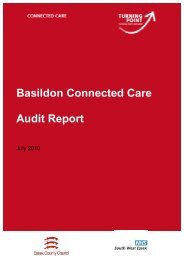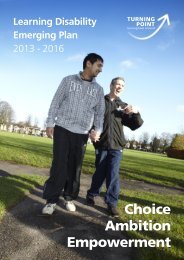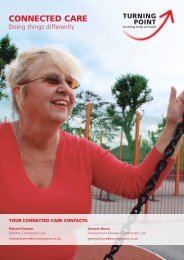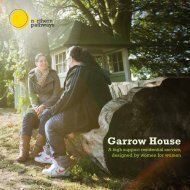Citizen Advisors - Turning Point
Citizen Advisors - Turning Point
Citizen Advisors - Turning Point
Create successful ePaper yourself
Turn your PDF publications into a flip-book with our unique Google optimized e-Paper software.
<strong>Turning</strong> <strong>Point</strong> Connected Care Report 16<br />
3. Local Area Coordination<br />
Local Area Coordination (LAC) is a model of navigation that has been adopted<br />
in different parts of the world. Focussing on people with social care needs such<br />
as people with disabilities, mental health issues, older people and carers, it<br />
emphasises the importance of fostering links in the community and acting in a<br />
preventative manner, as well as with directing individuals to services.<br />
LAC is primarily a model of neighbourhood or community support, and perhaps<br />
the most important aspect of the programme is that it is ‘Local Area’<br />
Coordination. Local Area Coordination attempts to utilise the strengths and<br />
resources of the local community to promote the development of supportive<br />
social networks, and the model draws heavily upon the concept of social capital.<br />
Social capital refers to the social connections amongst individuals and in recent<br />
years it has come to take on a broader meaning which includes feelings of trust,<br />
safety and belonging to an area. From a health and social care perspective,<br />
building social capital involves promoting self-help and mutual aid within a<br />
community, which helps promote well-being and reduces dependency on<br />
expensive public services. There is now much focus on attempting to build<br />
social capital in communities across England.<br />
The following sections will consider the model as it has been adopted in<br />
Australia, Scotland and Middlesbrough and Darlington, where particular<br />
attention has been paid to helping individuals to get the support that they need<br />
in their own community.<br />
3.1 Australia<br />
The Local Area Coordination (LAC) model originated in rural Western Australia<br />
in the 1980’s to assist people with disabilities to plan, organise and access<br />
support as they are disadvantaged by geographic distance from the majority of<br />
services. By the mid 1990’s the programme had been extended to urban areas<br />
in Western Australia and full coverage across the state was achieved in 2000.<br />
The aim of LAC is to encourage people with disabilities to access services and<br />
get involved in their local community by providing a fixed point of accountability<br />
through the form of a Local Area Coordinator. In Western Australia, LAC is<br />
available to people with intellectual, physical, sensory, neurological and/or<br />
cognitive disability who are under the age of 65 at the time of their application. In<br />
November 2002, there were 7,054 people with disabilities registered with LAC<br />
across Western Australia, supported by 124 Local Area Coordinators.<br />
Local Area Coordinators work to make local communities more inclusive and<br />
welcoming for people with disabilities through education, advocacy and the<br />
development of partnerships with local community members and organisations,<br />
government agencies and businesses. Alongside this, Local Area Coordinators<br />
also work with the people involved with supporting people with disabilities so<br />
that they are strengthened and supported in their caring role.<br />
The charter upon which the LAC in Western Australia is based reads as follows;


